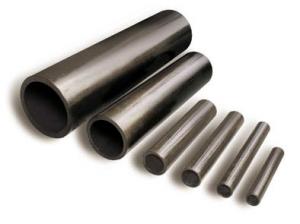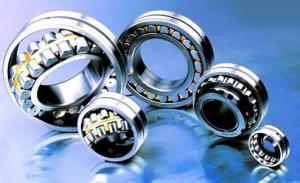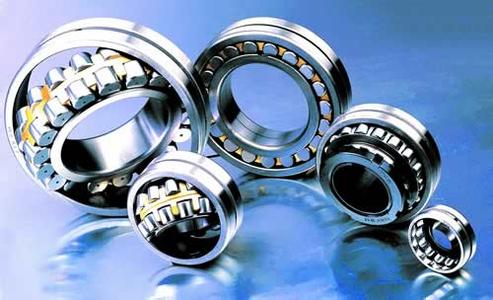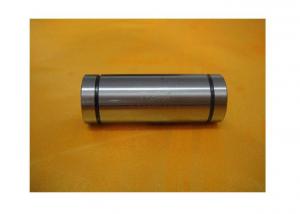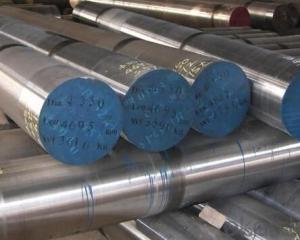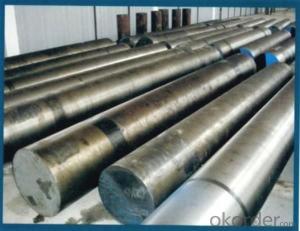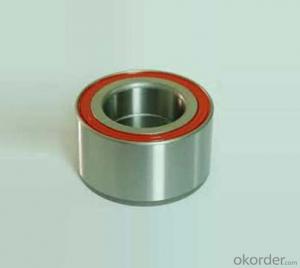Bearing Steel with High Quality
- Loading Port:
- China Main Port
- Payment Terms:
- TT or LC
- Min Order Qty:
- -
- Supply Capability:
- -
OKorder Service Pledge
OKorder Financial Service
You Might Also Like
Product Description:
OKorder is offering Bearing Steelsat great prices with worldwide shipping. Our supplier is a world-class manufacturer of steel, with our products utilized the world over. OKorder annually supplies products to European, North American and Asian markets. We provide quotations within 24 hours of receiving an inquiry and guarantee competitive prices.
Product Applications:
Our products have been used in all kinds of areas, such as aviation, aerospace, navigation, nuclear, energy, chemical industry, electronic information, petrochemical, automotive, instrument and meter, Communication ,transportation, and medical instruments, etc. Bearing ring,steel rolling mill ,machinery, 100Cr6 bearing steel ball is widely used in high-speed and low-noise bearing, bicycle, motorcycle, automobile, bags, electronics.
.
Product Advantages:
OKorder's Bearing Steels are durable, strong, and resist corrosion.
Main Product Features:
· Premium quality
· Prompt delivery & seaworthy packing (30 days after receiving deposit)
· Corrosion resistance
· Can be recycled and reused
· Mill test certification
· Professional Service
· Competitive pricing
Product Specifications:
Grade | AISI 52100, ASTM E52100, DIN 1.3505,JIS SUJ2, GCr15 |
Dimensions | Diameter: 30-60mm Length: 2000-13000mm or as required |
Shape | Round Bar |
Type | Alloy Steel Bar |
Delivery Condition | Black Surface |
Material | Bearing Steel |
Technique | Hot Rolled |
First the famous 1C-1.5Cr steel from which the majority of bearings are made. Its structure is apparently well-understood and the focus is on purity in order to avoid inclusions which initiate fatigue during rolling contact. Then there is the M50 steel and its variants, from which bearings which serve at slightly higher temperatures in aeroengines are manufactured, based on secondary-hardened martensite.
Tapered roller bearing are generally used to support combined load mainly consisting of radial load. Their cups are separable for easy assembling ,During mounting and using, radial clearance and axial clearance can be adjusted and preloaded mounting can be made.
FAQ:
Q1: Why buy Materials & Equipment from OKorder.com?
A1: All products offered byOKorder.com are carefully selected from China's most reliable manufacturing enterprises. Through its ISO certifications, OKorder.com adheres to the highest standards and a commitment to supply chain safety and customer satisfaction.
Q2: How do we guarantee the quality of our products?
A2: We have established an advanced quality management system which conducts strict quality tests at every step, from raw materials to the final product. At the same time, we provide extensive follow-up service assurances as required.
Q3: How soon can we receive the product after purchase?
A3: Within three days of placing an order, we will begin production. The specific shipping date is dependent upon international and government factors, but is typically 7 to 10 workdays.
Images:
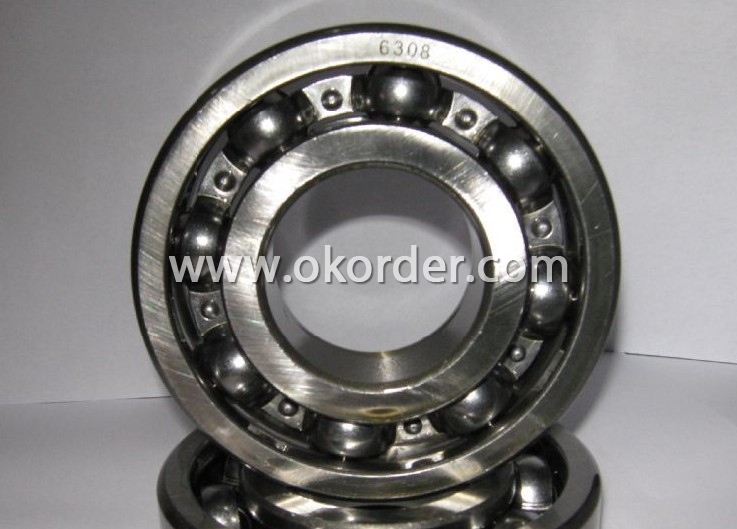
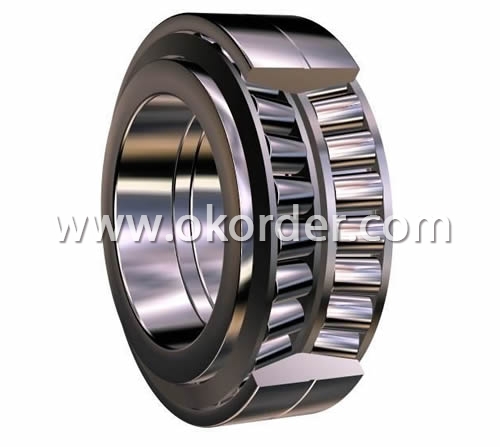
- Q: What are the different surface modification techniques used for special steel?
- There are several surface modification techniques used for special steel to enhance its properties and improve its performance in specific applications. Some of the common techniques include: 1. Nitriding: Nitriding is a surface hardening process that involves the diffusion of nitrogen into the steel surface. It forms a hard layer of nitrides, which significantly increases the surface hardness, wear resistance, and fatigue strength of the steel. 2. Carbonitriding: Carbonitriding is a similar process to nitriding, but it involves the diffusion of both carbon and nitrogen into the steel surface. This technique increases the surface hardness and also improves the wear resistance and fatigue strength of the steel. 3. Case hardening: Case hardening involves the addition of a hard, wear-resistant layer to the surface of the steel. This can be achieved through processes like carburizing or carbonitriding, where carbon is introduced into the surface layer, transforming it into a high-carbon martensitic layer. 4. Shot peening: Shot peening is a technique that involves bombarding the steel surface with small, high-velocity shots of media, such as steel, ceramic, or glass beads. This process induces compressive stresses on the surface, improving its fatigue strength and resistance to stress corrosion cracking. 5. Electroplating: Electroplating is a common technique used to apply a thin layer of metal coating onto the steel surface. This can be done with various metals like zinc, nickel, or chromium, providing protection against corrosion, improving aesthetics, and enhancing wear resistance. 6. Physical vapor deposition (PVD): PVD is a coating technique that involves depositing thin layers of material onto the steel surface through a vacuum process. This technique can be used to apply coatings like titanium nitride (TiN), which provides excellent wear resistance and reduces friction. 7. Laser surface modification: Laser surface modification techniques, such as laser hardening or laser alloying, use a high-energy laser beam to selectively heat and modify the steel surface. This process can improve hardness, wear resistance, and corrosion resistance. These surface modification techniques can be tailored to meet specific requirements, enhancing the properties of special steel for various applications in industries such as automotive, aerospace, and tooling.
- Q: What are the key alloying elements used in special steel?
- The key alloying elements used in special steel are typically chromium, nickel, molybdenum, vanadium, and tungsten. These elements are added in varying proportions to enhance specific properties such as corrosion resistance, strength, hardness, and heat resistance, making special steel suitable for various applications in industries like aerospace, automotive, and construction.
- Q: How does wear-resistant steel protect against abrasive wear?
- Wear-resistant steel protects against abrasive wear by having a higher hardness and toughness compared to the material it is protecting. This allows it to withstand the impact and friction caused by abrasive particles, reducing the wear and increasing the lifespan of the steel.
- Q: How does tool and die steel maintain its hardness and wear resistance?
- Tool and die steel maintains its hardness and wear resistance through a combination of factors such as its chemical composition, heat treatment, and surface treatments. The steel is typically alloyed with elements like chromium, vanadium, and tungsten, which enhance its hardness and wear resistance properties. Additionally, through heat treatment processes like quenching and tempering, the steel is subjected to controlled heating and cooling cycles, which further contribute to its desired hardness and toughness. Surface treatments like nitriding or coating with materials like titanium nitride can also be applied to improve the wear resistance of the steel. Overall, it is the careful selection of steel composition, precise heat treatment, and appropriate surface treatments that enable tool and die steel to maintain its hardness and wear resistance.
- Q: How does special steel contribute to the construction aftermarket industry?
- Special steel contributes to the construction aftermarket industry by offering enhanced strength, durability, and corrosion resistance. It enables the construction of high-rise buildings, bridges, and other infrastructure projects that require superior performance and safety. Additionally, special steel allows for the use of lighter and more efficient designs, reducing costs and environmental impact. Overall, it plays a crucial role in pushing the boundaries of construction capabilities and meeting the growing demands of the industry.
- Q: How does special steel contribute to reducing product rejection rates?
- Special steel contributes to reducing product rejection rates by offering superior quality and performance compared to regular steel. Its unique properties, such as increased strength, durability, and corrosion resistance, ensure that products made with special steel are more reliable and less prone to defects or failures. This, in turn, leads to a decrease in product rejection rates as it minimizes the likelihood of manufacturing errors, enhances product lifespan, and improves overall customer satisfaction.
- Q: How does special steel perform in erosion applications?
- Special steel performs exceptionally well in erosion applications due to its high resistance to wear and corrosion. Its unique composition and enhanced durability make it an ideal choice for environments where erosion is a common concern. Special steel's ability to withstand abrasive forces and maintain its structural integrity over time ensures long-lasting performance and minimizes the need for frequent replacements or repairs.
- Q: How does special steel perform in extreme cold temperatures?
- Special steel is specifically designed to perform well in extreme cold temperatures. It is made using alloys that have a low temperature ductility, meaning they can withstand and maintain their structural integrity even in extremely cold conditions. This type of steel is often used in applications such as Arctic exploration, oil and gas operations in cold environments, and in the aerospace industry. One of the key properties of special steel is its ability to resist brittleness at low temperatures. Unlike regular steel, which becomes brittle and prone to cracking in extreme cold, special steel retains its toughness, making it suitable for use in sub-zero conditions. This is achieved by carefully selecting and controlling the composition of the alloy, which allows for a better balance between strength and ductility. Furthermore, special steel has excellent corrosion resistance, which is particularly important in cold environments where exposure to snow, ice, and moisture is common. The alloying elements in special steel, such as chromium and nickel, form a protective oxide layer on the surface, preventing corrosion and maintaining the structural integrity of the steel. In addition, special steel also has good thermal conductivity, which means it can efficiently transfer heat even in extreme cold temperatures. This property is crucial in applications where heat management is essential, such as in the aerospace industry or in equipment operating in cold climates. Overall, special steel is specifically engineered to perform exceptionally well in extreme cold temperatures. Its low temperature ductility, resistance to brittleness, corrosion resistance, and thermal conductivity make it a reliable and durable material for various applications in cold environments.
- Q: How does electrical steel contribute to the production of transformers and motors?
- Electrical steel, also known as silicon steel, plays a crucial role in the production of transformers and motors. Its unique magnetic properties, achieved through the addition of silicon, allow for efficient energy transfer and reduction of energy losses. The low core loss and high magnetic permeability of electrical steel enable transformers to convert high voltage electricity into lower voltage levels, and motors to efficiently convert electrical energy into mechanical motion. In essence, electrical steel is the essential material that enables the high efficiency and performance of transformers and motors, making them indispensable components in various electrical applications.
- Q: How does special steel contribute to reducing product rejection rates in quality control?
- Special steel contributes to reducing product rejection rates in quality control by providing superior strength, durability, and resistance to wear and tear. These properties enable the production of high-quality components and eliminate common defects such as distortion, cracking, or premature failure. Additionally, special steel's precise composition and manufacturing processes ensure consistency and accuracy in the final products, reducing the likelihood of manufacturing errors and subsequent rejection during quality control inspections.
Send your message to us
Bearing Steel with High Quality
- Loading Port:
- China Main Port
- Payment Terms:
- TT or LC
- Min Order Qty:
- -
- Supply Capability:
- -
OKorder Service Pledge
OKorder Financial Service
Similar products
Hot products
Hot Searches
Related keywords
